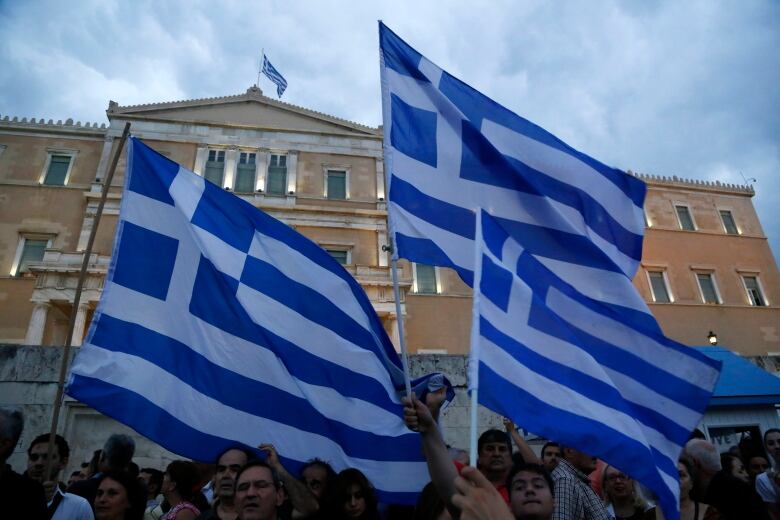Greece defaults on IMF loan. Now what?
'Were now into territory that no one has a map for,' says one expert
Thefinancial crisis unfolding inGreece is unprecedented, and few experts are prepared to speculate on just what might happen nextnow that the country has defaulted on one of itsmany sizeable debts.
"We're now into territory that no one has a map for and there are no instructions for, and, you know, [that] no one has a very good plan for," andPhilTriadafilopoulos, an associate professor of political science at the University of Toronto
Greece missed the Tuesday deadline to make a 1.55 billion euro payment on its debt tothe International Monetary Fund, and is now officially in arrears.
Greece pitched a two-year deal to restructure its debt just hours before the Tuesdaydeadline. However,German Chancellor Angela Merkelseemed to throw cold water on the idea, saying there would be no further negotiations with Greece until after Sunday's referendum, in which Greeks will decide whether they want to accept their creditors' bailout conditions or exit the eurozone.
"It's just incredibly fluid," said Michael Klein, an economist at Tufts University who has workedatthe U.S.Treasury Department.
Uncharted waters
Greece is the first developed country to default on its IMF debtsince the fundwas created in 1945, and entering arrears puts it in the same leagueas countries such as Zimbabwe, the last to miss an IMF payment,Sudan and Cuba.
A default on the IMF loan makes Greece ineligible for further IMF assistance until it pays down its debt, but it also has ramifications for its other creditors, to whom it owes a total of almost 243 billion euros ($338 billion Cdn), and is also the first step toward a possible exit fromthe eurozone andpossibly theEuropean Union.
Either of these scenarios would bring Greece's economy to a screeching halt.
There has already been a run on the country's banks, with Greeks lining up in recent weeks to drain theiraccounts. Even with Monday's implementation of capital controls and a60 euroa day withdrawal limit, it will be extremely difficultto carry out day-to-day business.
"Imagine if you all of a sudden were limited to taking $67 US out of the bank each day, and just think about the bills you get in your mail, and you're just unable to pay them,"said Klein.
"So, even if people have stashed away a lot of money, which is likely, people want to hoard their money in times of great uncertainty like this It's just going to be a terrible situation."
Klein suggests that Greece might bring ina temporary currency, which would in turn create a black market for the euro. But he added that whatever happens, it's all uncharted territory

"It's sort of out of the range of our experience,"said Klein.
Many Greeks including those living abroadare alreadykeenly feeling the effects of the crisis.Greek businessman Alexander Alexakis is the vice-president of Canadian operations at Krinos Foods, the biggest importer of Greek food products to Canada. He said the latest developments came as a big surprise.
"Everybody's at a loss, they don't know what to do next," he said.
He said his suppliers in Greece don't want him to pay them because they can't access their funds from Greek banks.
"So, I guess they're going to wait it out until next week to see if the controls will go away,"he said.
Alexakis said his company has enough stock to last three months, but saidthe situation will worsen if Greece's finances don't get some kind of stability soon.
"We're going to be in deep trouble supplying the market here."
Potential for 'troubling'instability
Even if Greece comes to a new bailout agreement with the EuropeanCentral Bank, it willlikely still have to endure several more years of painful austerity measures, which in turn would mean more years of social and political unrest.
The real concern is that people look around for the next slowest antelope who will fall next?-Michael Klein, economy professor, Tufts University
If Greece is forced to leave the euro andintroduce a new currency, which Triadafilopoulos predicts would be significantly devalued against the euro, that will make it difficult for Greece to import food and medicine, among other essentials.
"If people are deprived of access to food and medicine, they're not likely to be very happy," he said.
"Add to that a place that's been racked by civil war within the lifetime of many people going through this yet again, and an intensified left-right split when the party system of the last few years collapsed, and you have a situation that could be very unstable, very troubling."
Domino effect
If Greece leaves either the euro or the entire European Union, thatcould also create a domino effect on other heavily indebtedEuropeancountries that are also chafing under central bank rules and punishingausterity measures.
"The real concern is that people look around for the next slowest antelope who will fall next?"said Klein.
Klein said this could be the first of many exits from the eurozone, adding that the international consequences would be much more dire if a much bigger country were to leave.
"It all depends on how and if the contagion spreads,"said Klein.
Slight silver lining, to some
Despite the chaos, some, including Greek'sleft-wing governing Syriza party, see a Greek default as a positive step for a country exhausted by years of austerity.
"They're saying 'Listen, we don't know what's coming, but at least it will be temporary and at some point through devaluation and other means we'll be back on our feet, and at least have control of our own fate',"said Triadafilopoulos.
Prime Minister AlexisTspiras's description of the ECB's proposals as "humiliating" to Greece is a powerful trope that will resonate with many Greeks, he said.
Regardless of what happens in Sunday'sreferendum, all options are bleak.
"For a political scientist, this is extremely interesting. But for a Greek citizen, it's clear from media coverage and others that the uncertainty is very hard to live with,"said Triadafilopoulos.













_(720p).jpg)


 OFFICIAL HD MUSIC VIDEO.jpg)
.jpg)



























































































